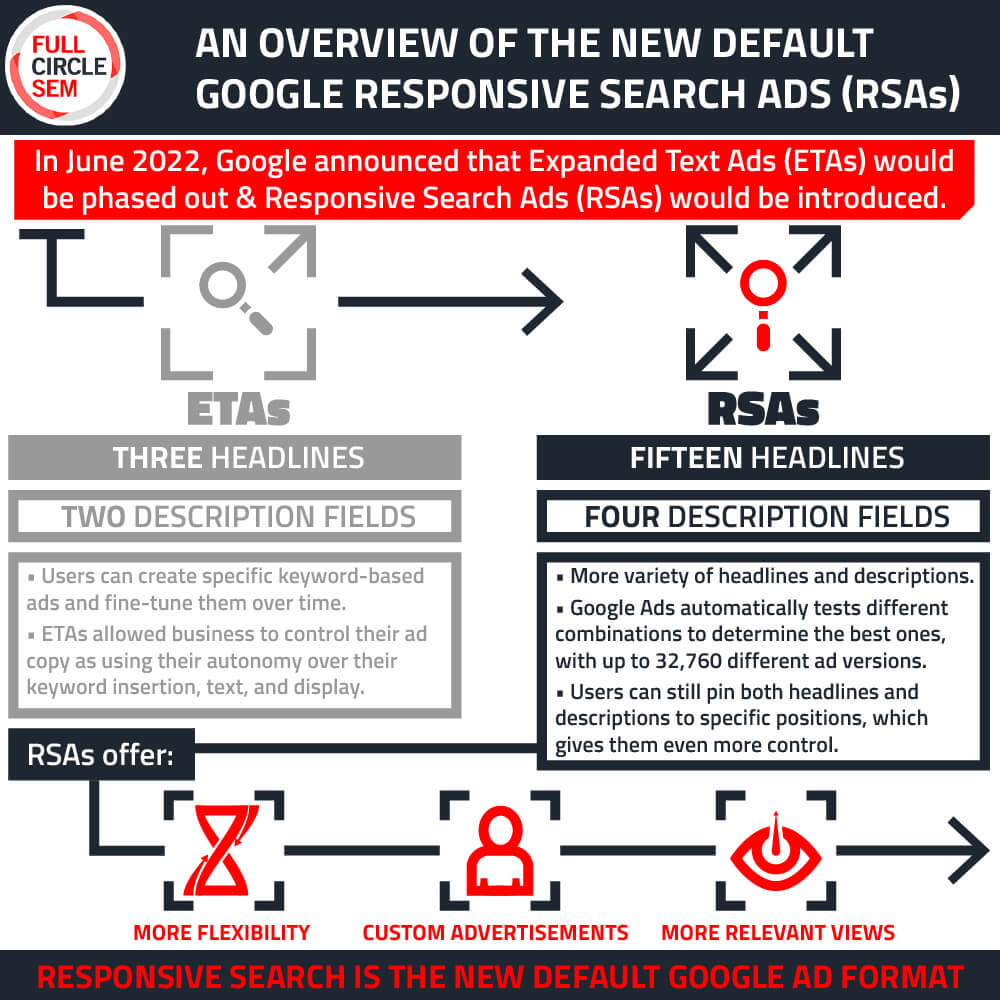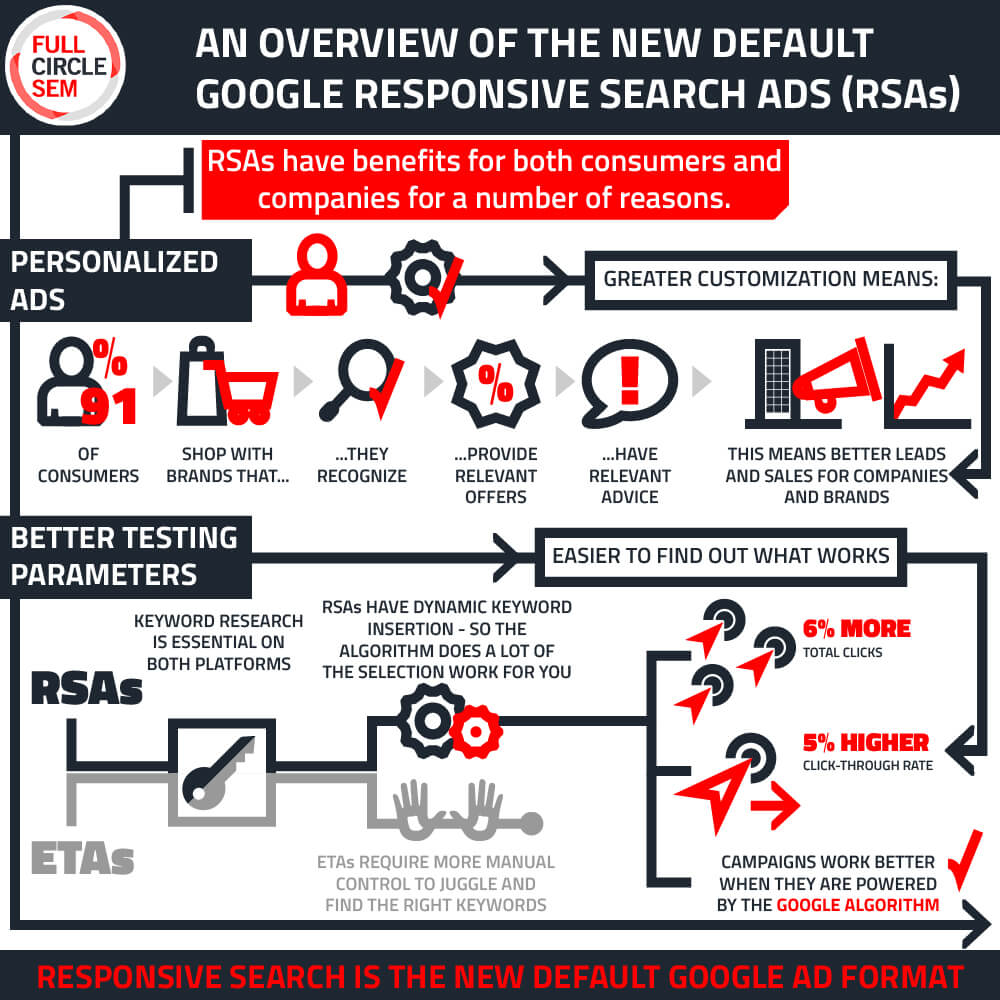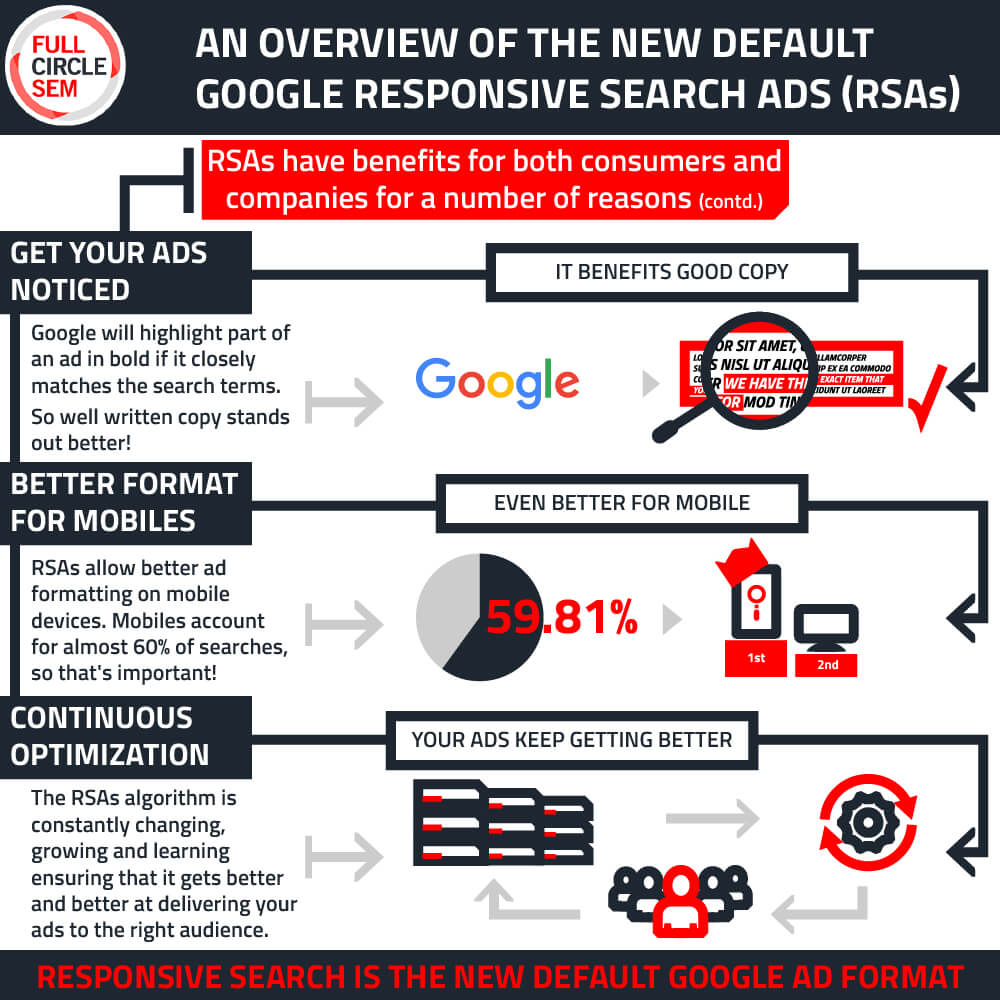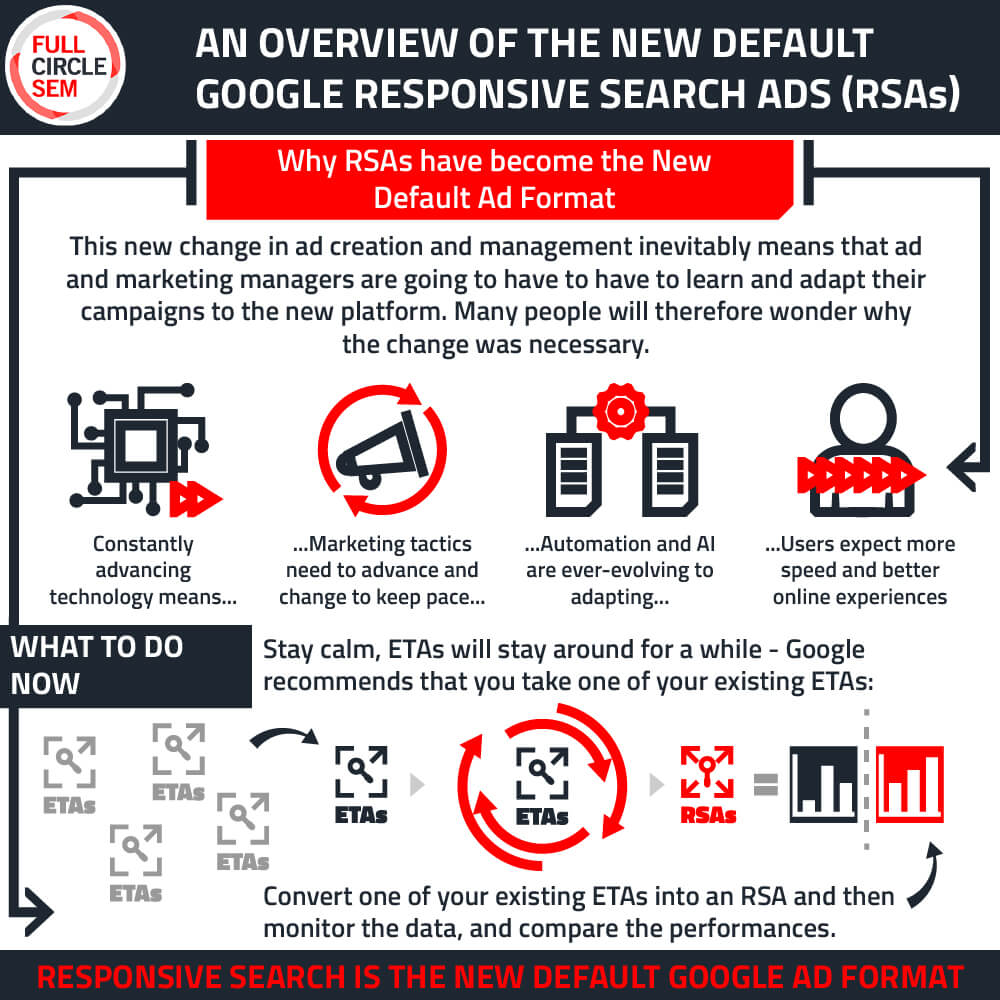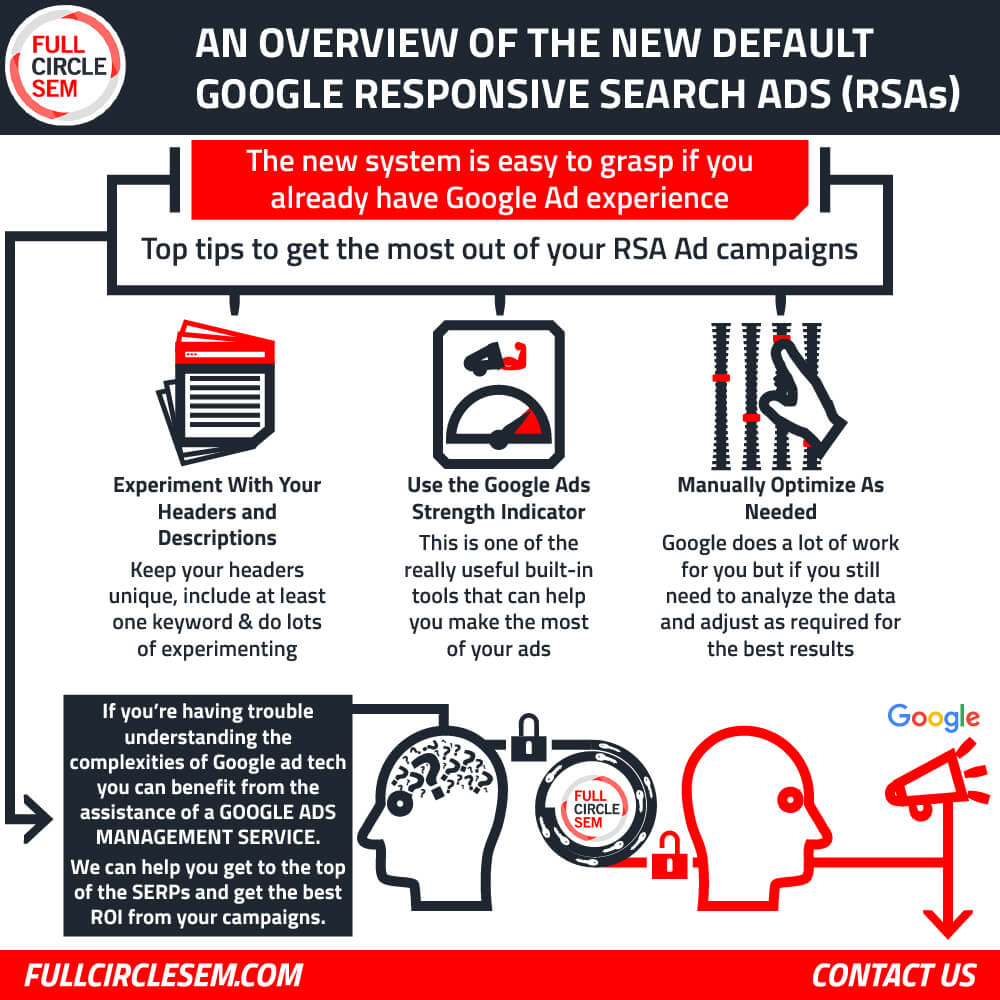Now that everyone has had a chance to fine-tune a strategy for Google’s Expanded Text Ads, Google has officially adopted Responsive Search as its new default ad format. While the constant changes always keep marketers and ad buyers on their toes, and we’re always happy to complain about Google (haha), Google Responsive Search Ads (RSAs) are a positive step forward in digital advertising.
RSAs offer flexibility that ETAs could not. With 15 different headlines and 4 descriptors for the algorithm to choose from, your ads are automatically optimized to serve a broader target market. Google tests each configuration by mixing and matching to suit the best fit for the viewer, essentially creating a custom advertisement. And, of course, the more relevant views of your ads, the more clicks, leads, and sales come into your business.
Whether you’re a seasoned marketer or just starting out, we’ll help you understand the key features of Responsive Search Ads and how to utilize them in your digital advertising strategy effectively.
The Previous Default: Expanded Text Ads (ETAs)
Before introducing Responsive Seach Ads, go-to Google ads campaigns revolved around expanded text ads. This format of three headlines and two description fields allowed users to create specific keyword-based ads and fine-tune them over time.[1]
In essence, the main benefit of ETAs was the ability to control your ad copy. Each business had autonomy over its keyword insertion, text, and display.
How Responsive Search Ads Work
As of June 2022, Google announced ETAs would be faded out, and Responsive Search Ads were introduced. Of course, you can still run existing ETA ads alongside the new Responsive Search Ads, but new ones cannot be created. Until you feel confident to make the switch to RSAs fully, it’s a good idea to keep both in play.
Previously, you only had the option of having 3 headlines. With RSAs, you can enter up to 15 headlines and 4 accompanying descriptions. Over time, Google Ads automatically tests different combinations to determine which performs best, showing up to 32,760 different ad versions.[2]
And even though Google does a lot of the testing for you, you still can pin headlines and descriptions to specific positions, offering more control and perfect for information like disclaimers.
The Benefits of Responsive Search Ads
Personalized Ads
One of the main benefits of Google’s new responsive ads is greater personalization. Offering a more personalized user experience isn’t only a bonus for the searcher. It’s also great for your brand and Google’s primary objective.
Research shows that 91% of consumers are more likely to shop with brands that they recognize, remember, and provide relevant offers and recommendations.[3] Ads that create a more individualized experience are more likely to convert to leads and sales.
Better Testing Parameters
There’s no escaping the keyword research, but the benefit of responsive search is that Google’s added dynamic keyword insertion feature means less time spent juggling keywords to find the highest-performing match. Instead, the algorithm does that for you.
While you may not have as much control over testing, Responsive Search Ads allow you to write up to 15 different headlines and two 90-character description fields to give the algorithm more to work with. With ETAs, we only had a single 80-character line.
A recent Google study found that Responsive Search Ads resulted in 6% more clicks and a 5% higher click-through rate than its ETA predecessor.[4] When you leave most of the testing to Google, the numbers show your ads will be more successful.
Get Your Ads Noticed
Another advantage of Responsive Search Ads is that Google will highlight part of an ad in bold if it closely matches the search terms. This means carefully worded ad copy will stand above the competition.
Better Format For Mobile Devices
With billions of smartphones in billions of pockets across the globe, it’s no surprise that most searches aren’t conducted on a computer. Recent 2023 studies from January report that 59.81% of all search traffic came through mobile phones.[5] Responsive Search Ads give you more options to optimize for mobile search by selecting headlines and descriptions that aren’t too wide for mobile viewing.
Continuous Optimization
The algorithm and its AI tech are in a near-constant state of change, growth, and learning. The more data it has, the more it knows how to optimize your ads to reach the right audience. As search queries are made, and viewers engage with your ads, they become more relevant. This increases the likelihood that they’ll be served to more and more people.
Here’s Why This Is The New Default Ad Format
So why another change in ad creation and management? It’s a straightforward reason – as technology advances, so do marketing tactics. Automation and AI are ever-evolving, meaning users expect faster, personalized online experiences.
Naturally, Google also wants to create a smoother user experience for those using the platform for search and businesses using it to advertise. Implementing Responsive Search Ads helps achieve this goal, streamlining advertising campaigns while getting relevant ads out to searchers.
And there’s no need to panic. Your existing Extended Text Ads aren’t going to disappear. However, Google advises repurposing high-performing content from one of your ETAs to create at least one responsive search ad to run alongside it until you’re ready to make the switch fully.[6] For now, you can continue running your existing ads, monitor the data, and compare performance.
Tips For Responsive Search Ads
If you’ve been creating Google ads for a while, it’ll only take a slight adjustment to get the hang of the new system. Here are our top tips to help you get the most out of your Responsive Search Ad campaigns.
Experiment With Your Headers and Descriptions
The great thing about RSAs is the increased number of headlines and descriptors you can write. Make the most of this feature by experimenting with different header lengths and description styles. Keep your headlines unique, remembering to include at least one keyword.
Use the Google Ads Strength Indicator
Google has built-in tools that provide guidance on ad creation. With the Ads Strength feature, you can learn how your ads can be optimized. This isn’t meant to be taken too seriously, but use it to figure out what may be missing from your ad and make small adjustments.
Manually Optimize As Needed
Yes, Google will do some of the hard work for you. But there’s no replacement for you. You still need to analyze the data and reports and make any necessary tweaks. Advertising is an ongoing, multifaceted strategy that is anything but stagnates.
How Google Ads Management Services Can Help
Overwhelmed by Google’s ad tech? Let the experts take your business to the top of the SERPs. A Google Ads Management Service helps you get the best ROI out of your campaigns while allowing you to spend time on other aspects of your business. Contact us today to learn more!
Sources:
[2] https://blog.hubspot.com/marketing/responsive-search-ads
[3] https://www.wunderkind.co/blog/article/smarterhq-wunderkind-audiences/
[4] https://support.google.com/google-ads/answer/10434300?hl=en
[5] https://gs.statcounter.com/platform-market-share/desktop-mobile/worldwide/#yearly-2011-2022
[6] https://support.google.com/google-ads/answer/11031467


